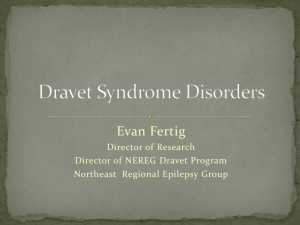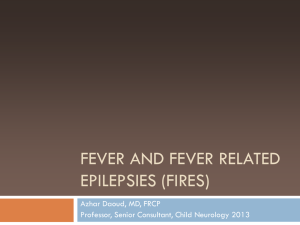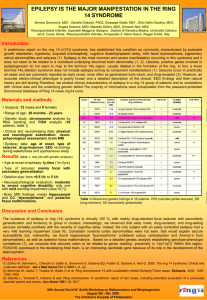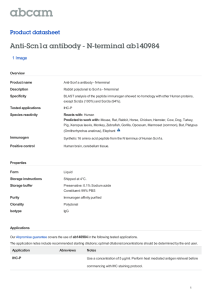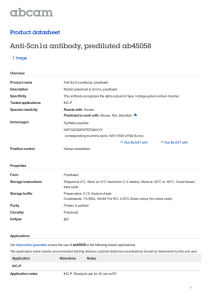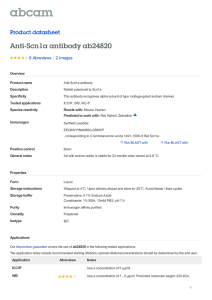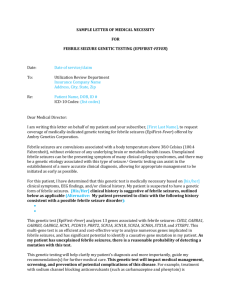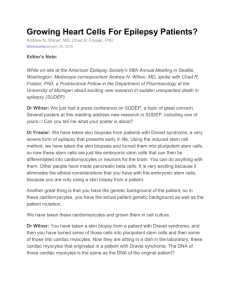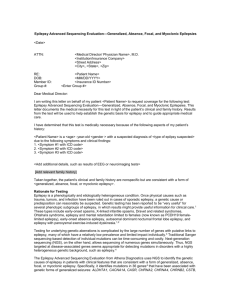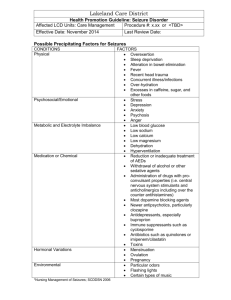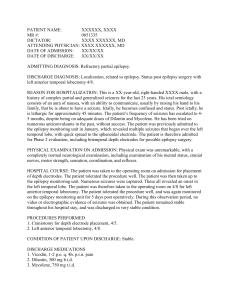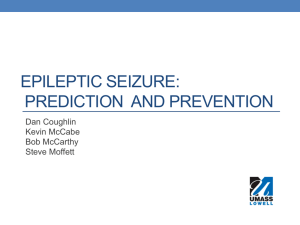SCN1A Evaluation - Test Code 573
advertisement
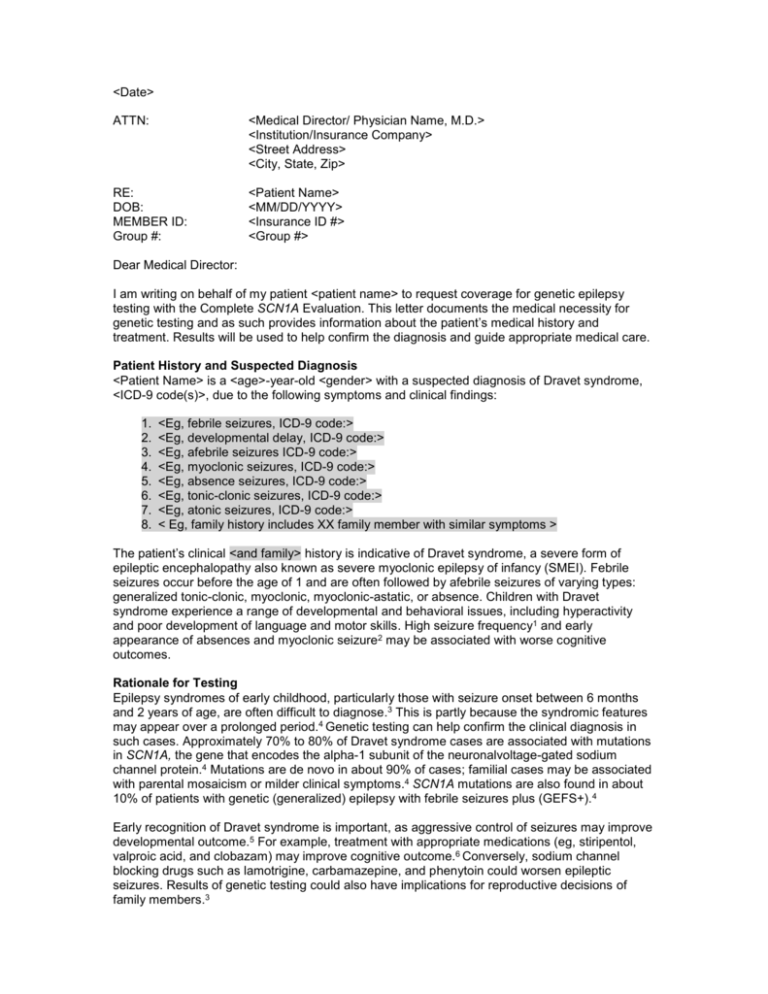
<Date> ATTN: <Medical Director/ Physician Name, M.D.> <Institution/Insurance Company> <Street Address> <City, State, Zip> RE: DOB: MEMBER ID: Group #: <Patient Name> <MM/DD/YYYY> <Insurance ID #> <Group #> Dear Medical Director: I am writing on behalf of my patient <patient name> to request coverage for genetic epilepsy testing with the Complete SCN1A Evaluation. This letter documents the medical necessity for genetic testing and as such provides information about the patient’s medical history and treatment. Results will be used to help confirm the diagnosis and guide appropriate medical care. Patient History and Suspected Diagnosis <Patient Name> is a <age>-year-old <gender> with a suspected diagnosis of Dravet syndrome, <ICD-9 code(s)>, due to the following symptoms and clinical findings: 1. 2. 3. 4. 5. 6. 7. 8. <Eg, febrile seizures, ICD-9 code:> <Eg, developmental delay, ICD-9 code:> <Eg, afebrile seizures ICD-9 code:> <Eg, myoclonic seizures, ICD-9 code:> <Eg, absence seizures, ICD-9 code:> <Eg, tonic-clonic seizures, ICD-9 code:> <Eg, atonic seizures, ICD-9 code:> < Eg, family history includes XX family member with similar symptoms > The patient’s clinical <and family> history is indicative of Dravet syndrome, a severe form of epileptic encephalopathy also known as severe myoclonic epilepsy of infancy (SMEI). Febrile seizures occur before the age of 1 and are often followed by afebrile seizures of varying types: generalized tonic-clonic, myoclonic, myoclonic-astatic, or absence. Children with Dravet syndrome experience a range of developmental and behavioral issues, including hyperactivity and poor development of language and motor skills. High seizure frequency1 and early appearance of absences and myoclonic seizure2 may be associated with worse cognitive outcomes. Rationale for Testing Epilepsy syndromes of early childhood, particularly those with seizure onset between 6 months and 2 years of age, are often difficult to diagnose.3 This is partly because the syndromic features may appear over a prolonged period.4 Genetic testing can help confirm the clinical diagnosis in such cases. Approximately 70% to 80% of Dravet syndrome cases are associated with mutations in SCN1A, the gene that encodes the alpha-1 subunit of the neuronalvoltage-gated sodium channel protein.4 Mutations are de novo in about 90% of cases; familial cases may be associated with parental mosaicism or milder clinical symptoms.4 SCN1A mutations are also found in about 10% of patients with genetic (generalized) epilepsy with febrile seizures plus (GEFS+). 4 Early recognition of Dravet syndrome is important, as aggressive control of seizures may improve developmental outcome.5 For example, treatment with appropriate medications (eg, stiripentol, valproic acid, and clobazam) may improve cognitive outcome.6 Conversely, sodium channel blocking drugs such as lamotrigine, carbamazepine, and phenytoin could worsen epileptic seizures. Results of genetic testing could also have implications for reproductive decisions of family members.3 The Complete SCN1A Evaluation detects mutations in the SCN1A gene associated with Dravet syndrome and GEFS+. It employs DNA sequencing to identify missense mutations and short deletions or duplications, along with multiplex ligation-dependent probe amplification (MLPA) to detect larger deletions often found in Dravet syndrome. The potential benefits of this evaluation for my patient include: Accurate genetic confirmation of diagnosis Avoidance of repeated investigations using expensive imaging techniques, including MRI scan, neurometabolic testing, skin biopsy, and other invasive tests Selection of appropriate therapy3 In short, the results of this genetic test will determine the diagnosis, identify anticonvulsant treatments to avoid, and provide prognostic information. I am therefore requesting that <patient name> be approved for the Complete SCN1A Evaluation through Athena Diagnostics (test code 573; CPT codes: 81407, 81479). Please support my decision for genetic testing for epilepsy for <patient name> and feel free to contact me at <physician phone number> if you have additional questions. Sincerely, <Physician Name>, <credentials> NPI #: <NPI#> Contact information: <Address if not on physician letterhead> Contact Phone No.: <phone number> Attachments: <Additional supporting documents> References 1. Ragona F, Brazzo D, De G, I, et al. Dravet syndrome: early clinical manifestations and cognitive outcome in 37 Italian patients. Brain Dev. 2010;32:71-77. 2. Ragona F, Granata T, Dalla BB, et al. Cognitive development in Dravet syndrome: a retrospective, multicenter study of 26 patients. Epilepsia. 2011;52:386-392. 3. Ottman R, Hirose S, Jain S, et al. Genetic testing in the epilepsies--report of the ILAE Genetics Commission. Epilepsia. 2010;51:655-670. 4. Hirose S, Scheffer IE, Marini C, et al. SCN1A testing for epilepsy: application in clinical practice. Epilepsia. 2013;54:946-952. 5. Scheffer IE, Zhang YH, Jansen FE, et al. Dravet syndrome or genetic (generalized) epilepsy with febrile seizures plus? Brain Dev. 2009;31:394-400. 6. Kassai B, Chiron C, Augier S, et al. Severe myoclonic epilepsy in infancy: a systematic review and a meta-analysis of individual patient data. Epilepsia. 2008;49:343-348.
